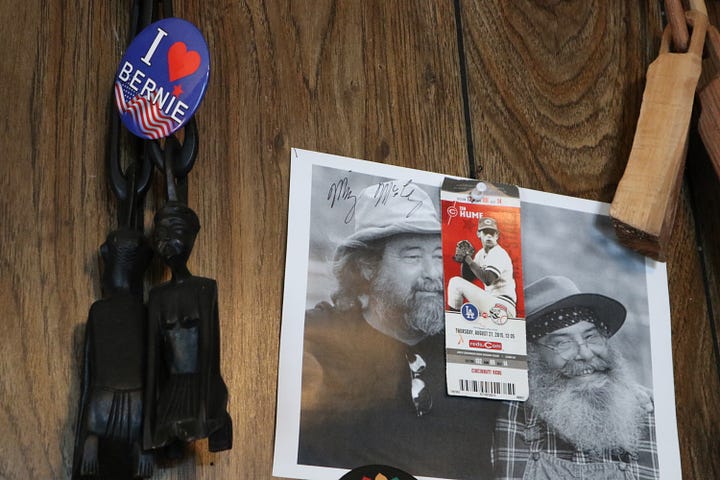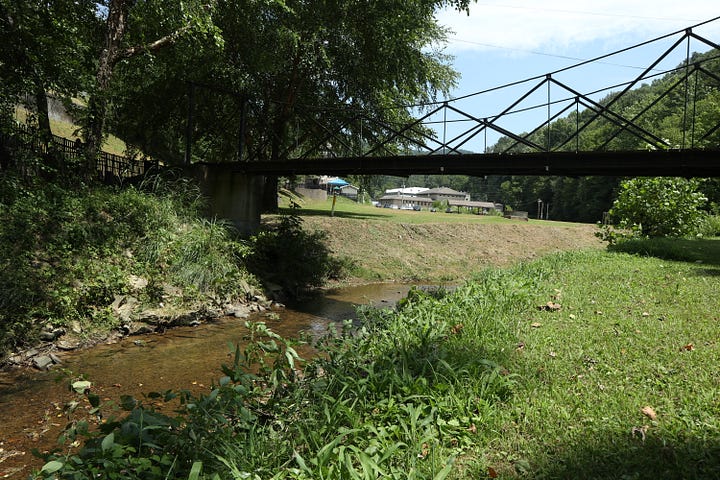Eastern Kentucky Dispatch Pt. 1
"All we know is what other folks have told us" - Jim Wayne Miller, poet
Hello from Pound, Virginia (also known as The Pound), across the border from where I’ve been reporting in Eastern Kentucky. Building on the last post, I figured I should write a little about why Appalachian rural stereotypes are still socially acceptable. Appalachian folks I’ve talked to all have plenty of stories of being mocked for their accents, for having too many kids, for having kids too young, etc. Of course there are stereotypes pinned on all rural people—like being gullible, brutish, and dirty—but for specificity’s sake I’m talking here about stereotypes about Appalachia (which, for a refresher, contains parts of 13 states along the Appalachian Mountain range and all of West Virginia, at least in the official policy definition) but more specifically Central and Southern Appalachia and surrounding areas. I’m talking about The Beverly Hillbillies, Deliverance, the more scripted parts of Duck Dynasty, aspects of Hillbilly Elegy, even Old Man McGucket from Gravity Falls. You all know the general picture. The examples above are especially on-the-nose in the sense that they are clearly depictions by non-Appalachian media creators of what they understand all rural people to be (I’ve decided not to go on a long tangent about whether or not J.D. Vance of Hillbilly Elegy—from the city of Middletown, Ohio—can claim to be Appalachian, but suffice it to say that when I’ve brought him up to people on my trip, his name is often met with some kind of expletive).
The issue with stereotypes, to paraphrase Chimamanda Ngozi Adichie, is not that there isn’t any aspect of truth to them, but that they are wildly incomplete. A stereotype makes a claim about all people in a group and implies that the trait is inherent. Oftentimes, a stereotype might show a phenomenon that does occur but covers up the causality of it—for instance, the idea that poor Appalachians (and poor people in general) buy hoards of cheap junk and junk food because they don’t have self-respect/are lazy/are ignorant obscures the fact that rural Appalachia is crawling with dollar stores because the presence of dollar stores pushes out larger grocery outlets. And, by the way, dollar stores *know* that their primary customer is low-income Americans and they are taking advantage of the fact that “'the economy is continuing to create more of our core customer’” to move into additional communities (that’s a quote from Dollar General’s CEO—in case you missed it, he’s referring to the widening income gap).
Okay, Hannah, you might be saying to yourself, stereotypes bad, I knew that. The more interesting question is why stereotypes about “mountain people” continue to float around—the average Joe in Seattle or Cincinnati may not know anyone personally from Appalachia, so why do the jokes score social points? Where the stereotypes originated from is another interesting question, but I’m not going to go into that, though it’s covered in depth in Elizabeth Catte’s What You’re Getting Wrong About Appalachia (here’s the short version: “local color” journalists in early 1900s found “mountain people” backwards and primitive and made lots of money sensationalizing; simultaneously, claiming subsistence farmers were backwards and thus needed to be civilized/disciplined was super convenient for early coal entrepreneurs and other aspiring natural-resource capitalists who needed a reason to put children in mines. Win-win for everybody besides Appalachians!). But anyway, why are the stereotypes pervasive among those of us who are not 20th century sandstone manufacturers rubbing our hands together greedily in smoky rooms? A few ideas (major credit to thinkers like Elizabeth Catte and other Appalachian Studies scholars, many of whom I am smushing together and paraphrasing):
1) Easy theory to explain why Americans seem to be more and more comfortable with right-wing autocracy. In 2016 Trump voters hailed from all over the country—moms in the Long Island suburbs, truck drivers from Pennsylvania, rich lawyers in Michigan. Wealthier people tended to vote for Trump. White women famously turned out for him in much higher numbers than any group of nonwhite women (in 2020, Trump literally pleaded “Suburban women, will you please like me?” at a campaign rally after reports suggested he was losing their support). But reporters flocked to West Virginia, which contributes only 5 electoral college votes, in the hopes of explaining Trump’s popularity. Much less coverage was given to that fact that Bernie Sanders beat Hillary Clinton in the Democratic primary in West Virginia[1], and in the general election, only 57% of West Virginians voted at all (in neighboring Virginia, 72% did).[2] The story is obviously more complicated than “Trump Country, USA.” But I think a narrative about millions of “backwards” gas station owners with bad teeth in McDowell County bringing Trump to national victory is more appealing because it concentrates the Trump Problem to one diseased area, instead of suggesting that, as Elizabeth Catte puts it, maybe “we are all residents of Trump Country.”
2) Makes white people feel better about racism. This is a roundabout one, but stay with me. Elizabeth Catte explains this more beautifully than I can, but basically, images of white poverty make white middle- and upper-class folks feel less bad about Black poverty. If anyone can be poor, and if many white people are, in fact, poor, then racism is not as responsible for keeping people in poverty as we were told. Poverty is a problem, but race is not a part of it, the thinking goes. So poor, rural white people are proof that at least some part of the American Dream is intact—we really are one big melting pot, and anyone can be poor, just like anyone can be rich. Racism solved! Also, laughing at poor people is at this point still socially acceptable (see next point).
3) Hating feels good and American meritocracy is the cherry on top. Let’s be real, there’s a little human bonding juice that happens when two people laugh at a third person and think the third person either doesn’t understand the joke or can’t hear them. We feel like we’re part of an “in group.” I’m not saying hating on others is an inevitable thing we all have to accept—the “better angels of our nature” tell us not to, and we should listen to them. We do have the power to choose not to make that snide comment. Making fun of “hillbillies” is also seen as a sort of social good—in theory, if they are what’s wrong with America and we shame them into silence or into changing, we will have done everyone a favor. People can justify it to themselves as progressive discrimination.
For a better summary of this than I could ever give, check out Jim Wayne Miller’s “Brier Sermon—You Must Be Born Again” (scroll down to section 51), which is read aloud at the end of every Appalachian Writers’ Workshop week. It was very moving to watch the ritual this year at AWW for the first time. Miller writes, addressing Appalachians:
“Then we went to the cities…
They said, you’re right from the heart of America.
They said, you’re the worst part of America.
They said, We ought to be more like you.
They said, You ought to be more like us.
You’ve heard the prayer that goes:
Help us to see ourselves as others see us.
Buddy, that’s not a prayer we want to pray.”
P.S. I love engaging with the comments, so plz leave one below if you have feelings, questions, or disagreements!




[1] https://www.politico.com/2016-election/primary/results/map/president/west-virginia/
[2] https://en.wikipedia.org/wiki/2016_United_States_presidential_election_in_West_Virginia#cite_note-1




Are you implying duck dynasty is about Appalachia, because I would reject that claim. I’m not very familiar with the other examples so I’m unsure if you are just showing rural poor white people in media or specifically Appalachian depictions in media. Ironically, the Robertson family is incredibly wealthy but they are still depicted with many of the poor rural stereotypes.
Good to hear your thoughts, Hannah! I’m looking forward to seeing you in person when you get back. Although we may be in Chautauqua when you get home - we return on Aug 12. Have a great final week on the road!!❤️😉💕